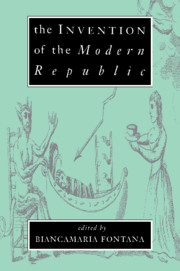Book contents
- Frontmatter
- Contents
- List of Contributors
- Acknowledgements
- Introduction: the invention of the modern republic
- 1 Ancient and modern republicanism: ‘mixed constitution’ and ‘ephors’
- 2 Checks, balances and boundaries: the separation of powers in the constitutional debate of 1787
- 3 From Utopia to republicanism: the case of Diderot
- 4 Cordeliers and Girondins: the prehistory of the republic?
- 5 The constitutional republicanism of Emmanuel Sieyès
- 6 The Thermidorian republic and its principles
- 7 Francesco Mario Pagano's ‘Republic of Virtue’: Naples 1799
- 8 Kant, the French revolution and the definition of the republic
- 9 French historians and the reconstruction of the republican tradition, 1800–1848
- 10 The republic of universal suffrage
- 11 The identity of the bourgeois liberal republic
- Bibliography
- Index
Introduction: the invention of the modern republic
Published online by Cambridge University Press: 05 February 2010
- Frontmatter
- Contents
- List of Contributors
- Acknowledgements
- Introduction: the invention of the modern republic
- 1 Ancient and modern republicanism: ‘mixed constitution’ and ‘ephors’
- 2 Checks, balances and boundaries: the separation of powers in the constitutional debate of 1787
- 3 From Utopia to republicanism: the case of Diderot
- 4 Cordeliers and Girondins: the prehistory of the republic?
- 5 The constitutional republicanism of Emmanuel Sieyès
- 6 The Thermidorian republic and its principles
- 7 Francesco Mario Pagano's ‘Republic of Virtue’: Naples 1799
- 8 Kant, the French revolution and the definition of the republic
- 9 French historians and the reconstruction of the republican tradition, 1800–1848
- 10 The republic of universal suffrage
- 11 The identity of the bourgeois liberal republic
- Bibliography
- Index
Summary
This collective research on ‘The Invention of the Modern Republic’ was originally prompted by two quite different sets of events that featured very prominently on our television screens in 1989: on the one hand the lavish ceremonies and celebrations occasioned by the 200th anniversary of the French revolution of July 1789; on the other the gatherings, protests and demonstrations which marked the end of socialist regimes in the countries of eastern Europe. It was difficult for the historian to resist the feeling that these episodes were – at least imaginatively or symbolically – somewhat connected with one another; but it was hard to identify the link between them and hard not to re-echo the platitudes and facile enthusiasm of journalists and news reporters.
One did not need to be a sceptic at heart to be puzzled by the sight of Jessye Norman, draped in the French flag, hovering round the Arc de Triomphe singing the ‘Marseillaise’. Was her performance intended to glorify liberty and universal values or to celebrate national pride? A blunder on the part of over-ambitious stage managers or just a new proof of the inexhaustible irony of history, of its infinite capacity to mix and pervert the symbols of the past? As for the cheering crowds in the squares of Berlin, Budapest and Prague, were they gathered there to applaud their liberation from foreign imperialism and domestic tyranny – as news reporters assured us – to voice renewed ethnic hostility, or to welcome the prospective delights of free-market society and consumerism – as the most censorious of western commentators were eager to suggest?
- Type
- Chapter
- Information
- The Invention of the Modern Republic , pp. 1 - 5Publisher: Cambridge University PressPrint publication year: 1994
- 4
- Cited by



